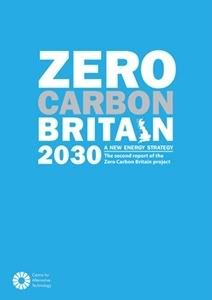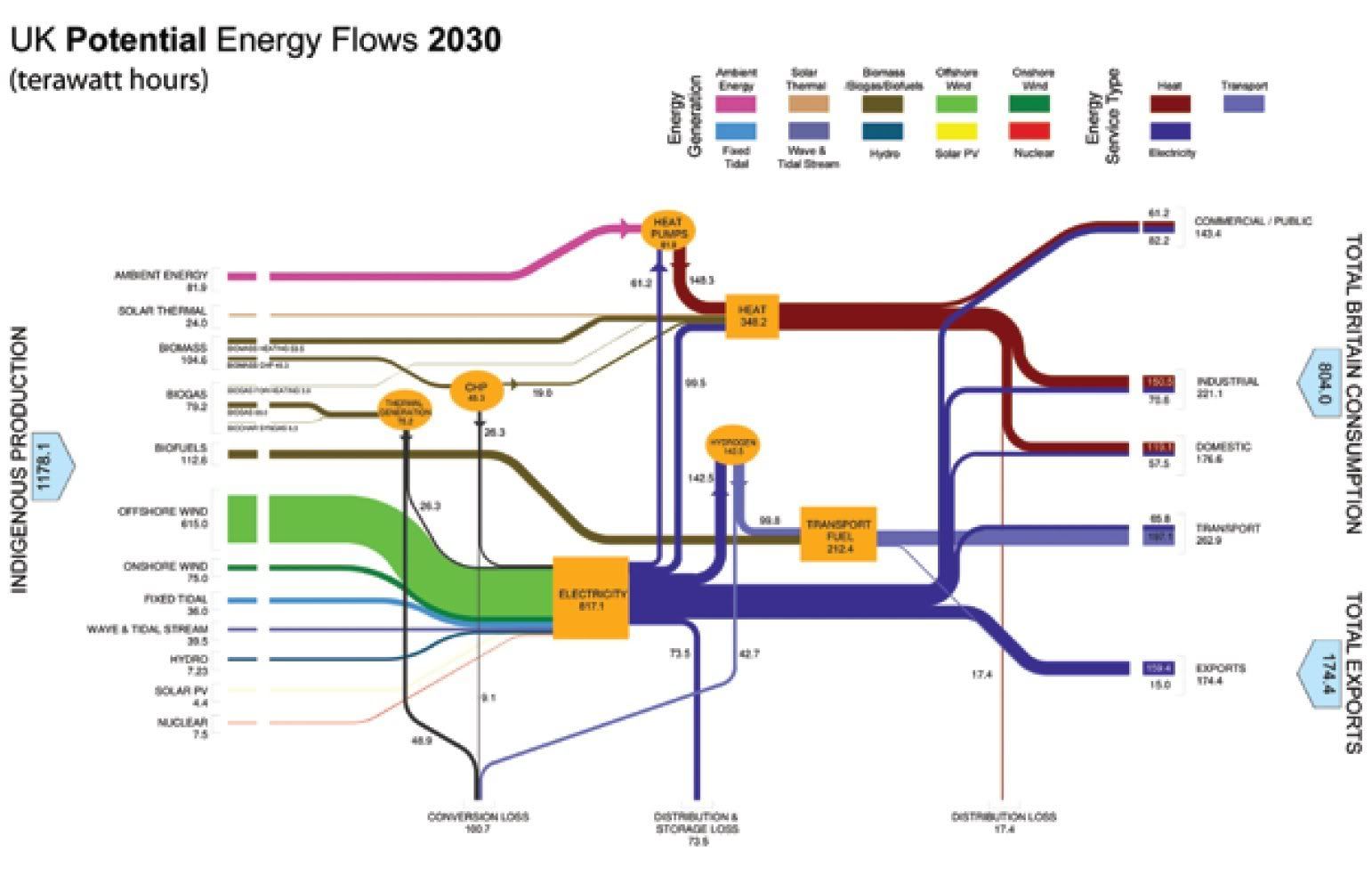With a hat-tip to Bronglais, I've just learned that Wales' very own Centre for Alternative Technology at Machynlleth has published a report called Zero Carbon Britain 2030. Download it by clicking the image:
This is a summary of what it's about:
A great many solutions to climate security are the same as solutions to energy security and to long-term economic recovery. A flagship of a new economic approach, ZCB2030 will show how we can re-focus the ingenuity of the finance sector on the actual challenges at hand. Rather than residing precariously at the end of the peaking pipeline of polluting fossil fuel imports, Britain can head an indigenous renewable energy supply chain powering a lean, re-localised economy. Every field, forest, island, river, coastline, barn or building holds the potential to become an energy and revenue generator, with different technologies appropriate to every scale or location.
Zero Carbon Britain 2030 clearly illustrates how the parallel de-carbonisation and re-vitalisation of the UK economy would work, creating a single document of immediate relevance to policy-makers everywhere.
This report follows hard on the heels of the report by the Offshore Valuation Group that I mentioned in the second part of this post. The major conclusion reached by each report is the same: that we simply don't need nuclear energy. The difference is the OVS report concludes that we can generate all the electricity Britain needs from offshore renewables by 2032, whereas this report says that we can produce the overall energy we need by 2030, including onshore renewables and biomass and with a programme of energy saving measures in buildings, transport and behavioural change. This diagram shows how:
For me, the most useful chapter was the one on Renewables, which says:
This chapter demonstrates how Britain can create a carbon-free, electricity-based energy system by 2030, using renewable energy and biomass alone, and without recourse to nuclear power.
As full report is 384 pages long, it might be best to start with the executive summary at the beginning and that chapter. But this is the full list:
• Climate science
• The energy security context
• Equity
• Climate and the built environment
• Transport
• Motivation and behavioural change
• Land use and agriculture
• Renewables
• Distributed generation and microgrids
• Policy and economics
• Employment
• Residual emissions
All in all it's a good handbook of information to download and use for reference. If Wales is to avoid being landed with a nuclear power station that we don't want, we need all the authoritative information we can get on better alternatives to it.




4 comments:
Interesting report and post. It has become fairly commonplace (and this is not a criticism of this post) to lump biomass in the zero carbon renewables when it is not. It is classified as a a low carbon renewable, but it has yet to prove that it can even achieve that, at least on these shores and particularly in Wales.
Apologies if you've covered this elsewhere, but the Prenergy biomass station presents a stark example for this argument. Leaving aside its universal unpopularity among the people of Port Talbot and councillors for the whole of Neath Port Talbot, along with concerns over for the safety of the area in the event of a fire (biomass can burn for weeks), it is difficult to see how this will achieve its stated aims.
For starters, biomass is an as-well-as problem, not an instead-of solution. Port Talbot already has the highest incidence of PM10s anywhere in Wales, and this would effectively add a permanent bonfire to the area's air pollution (This is also worth considering - http://news.bbc.co.uk/1/hi/sci/tech/7997398.stm).
That is, of course, if it can source the fuel. The Prenergy site would burn three million tonnes a year - equivalent to the entire annual biomass harvest of the US. Since there are applications for around 100 similar Stateside power stations, this will inevitably put a further squeeze on sourcing. Given that Australia, at five million tonnes, is the largest biomass producer in the world, there will too many stations chasing too little resources, which must impact upon prices.
If the project is completed and committed to (and there are grave questions as to whether it will ever be built), the area could be saddled with something it has never wanted while all of us face rising fuel prices.
The Welsh Government last week recommitted itself to its Low Carbon Energy Policy Statement, which includes a pledge to seek out: "low carbon energy production via indigenous (and thus secure) renewables". Bethan Jenkins AM asked Elin Jones AM in Plenary last week (http://www.bethanjenkins.org/welsh-government-policy-should-mean-no-to-biomass-stations) if we therefore have the land here in Wales to supply both the Prenergy plant and smaller 50MW stations at King's Dock in SA1 and Coed Bach, near Kidwelly. The Rural Affairs Minister conceded that biomass fuel would have to be sourced overseas.
So, if biomass has to come from all over the world, having presumably been harvested mechanically and shipped by sea, rail and perhaps road, does its benefit become so small as to be negligible?
In addition, Prenergy's oft-repeated claim that it can land biomass material at Port Talbot dock is not backed by Corus, which runs the dock and says it is currently at capacity.
It is my belief that this anti-social and beneficially questionable renewable never had its day. Yet convincing the Environment Minister, who seems to adopt a dogmatic view on renewables, is the devil's own task.
Of course, the Welsh Government has no competance for deciding on 50MW+ power stations, an utter travesty in principle, yet potentially devastating in practice. What, we may wonder, is the point of devolution when something that is so universally despised can be guided through by politicians who put what they perceive as national interest (although I hope I have shown that it isn't) ahead of local opinion, with expensive corporate lawyers all the while at their elbow?
But while the Welsh Government cannot make a ruling on biomass, it can - we hope - bring considerable influence to bear. And if Wales is to reject nuclear, then it must reject biomass, too.
(Apologies that this is so long.)
Thanks for such a detailed post, Duncan. No apologies necessary.
I pretty much agree with everything you've said (and Bethan's statement, which I'm sure had a big input from you). I think that biomass has a role to play in small-scale schemes (for example the new Welsh Government building in Llandudno Junction and some new hospitals) using locally harvested timber and waste wood such as pallets, primarily as a source of heat.
In principle Coed Bach might just about be OK as a combined heat and power plant but, as wth all CHP schemes, finding a partner that can use the heat is the bigger problem. But if 75% of the wood is to be imported, that in itself becomes a problem. It seems to suggest that one out of the two proposed schemes might be OK, but not both.
-
But I fully share your doubts about biomass as a fuel for power stations. Two reasons, exactly as you said: burning it produces more particulate and other emissions, and the viability of importing wood or wood pellets from around the world is questionable. It is very hard to be sure that such wood is sustainably harvested when demand is so high, and the carbon cost of transporting it negates some (though by no means all) of the carbon benefit.
It strikes me that the only reason large biomass power station schemes are being proposed is that the ROCs make such schemes economically viable, and that they are encouraged at a political level because they offer an easy way of reaching carbon targets in the short term. If targets are "everything" in political terms, it's hardly surprising that a minister will entertain them simply to be able to say that they did their job. The long term, integrated view gets squeezed out.
When ROCs were first introduced they were at a flat rate. Now there are different tariffs for different technologies. To me, the biomass tariff is much too high. If I could change one thing more, it would be to have different rates for different scales of operation to encourage smaller schemes but not larger ones (for what it's worth, I would also apply that to onshore wind) but there are other ways of doing the same thing, like rates relief ... and at very small scale you get into the realm of Feed-in Tariffs.
-
Turning to the report, I did wonder why "and biomass" was included, as I thought it would be fairly insignificant compared with other renewables. So I've just flicked though the report for mentions of biomass. These two quotes should help ease our concern:
"In the zerocarbonbritain2030 scenario over 70 million tonnes of biomass for energy is produced. This is used in the following ways: 16 million tonnes for biogas (bio-synthetic gas), mainly used to back up the electricity grid; 18 million tonnes of woody biomass for CHP; and 27 million tonnes to create kerosene, petrol and diesel using the Fischer-Tropsch process to power those parts of the transport sector for which there is currently no alternative to liquid fuels."
"... and only a small amount of food and biomass imports are allowed, under the assumption that they will be subject to stringent sustainability certification."
CAT seem to envisage woody biomass being used only for CHP, and only a "small amount" of imports. Biomass is also important as a method of carbon sequestration, and this appears to play a significant part in the overall zerocarbon calculations, as does land use. I'm sure there's more detail to be had by reading the report more thoroughly.
Cheers, MH. I've learned something today. Had never heard of ROCs! What you say makes a lot of sense. The issue is the supply, both the amount available (18m tonnes, I wouldn't be surprised, could be about the entire world output at present) and supply chains.
WAG is slightly hoisted by its own petard on this one, because it links indigenous with secure, suggesting that it recognises that local sources are the only way to guarantee those supply lines.
I could live with smaller projects along the lines you mention. There's been one at Newbridge-on-Wye for quite some time now, I think, taking waste from BSW's considerably-sized logging and timber operations in Powys. I'm not sure the Coed Bach scheme can go ahead without the King's Dock plant. I've had it explained to me, but there is a reason there is just one planning inquiry for the two sites.
I'll go read the report properly. I might learn something else! Cheers again for the post.
i will be thankful to you for sharing that type of content, it is looking much informative.
Australia Immigration Services New Delhi | immigration consultants in India | Best Immigration Consultants in Delhi
Post a Comment